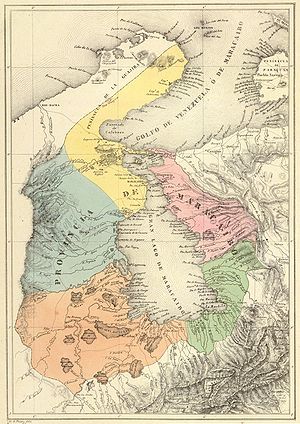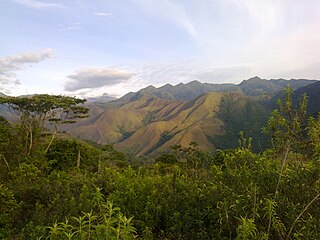
Zulia State is one of the 23 states of Venezuela. The state capital is Maracaibo. As of the 2011 census, it has a population of 3,704,404, the largest population among Venezuela's states. It is also one of the few states in Venezuela in which voseo is widespread. The state is coterminous with the eponymous region of Zulia.

Maracaibo is a city and municipality in northwestern Venezuela, on the western shore of the strait that connects Lake Maracaibo to the Gulf of Venezuela. It is the second-largest city in Venezuela, after the national capital, Caracas, and the capital of the state of Zulia. The population of the city is approximately 2,658,355 with the metropolitan area estimated at 5,278,448 as of 2010. Maracaibo is nicknamed "The Beloved Land of the Sun".

The State of Mérida commonly known simply as Mérida is one of the 23 states of Venezuela. The state capital is Mérida, in the Libertador Municipality.

Trujillo State is one of the 23 states of Venezuela. Its capital is Trujillo and the largest city is Valera. The state is divided into 20 municipalities and 93 parishes. Trujillo State covers a total surface area of 7,198 km2 (2,779 sq mi) and, has a 2011 census population of 686,367.

The Archdiocese of Maracaibo is an archdiocese in Venezuela. Since November 2000, its Archbishop has been Ubaldo Ramón Santana Sequera. The city of Maracaibo, the second largest in Venezuela, has a population of approximately 2,800,000. The Archdiocese covers a total area of 10,761 square kilometers in Zulia State.

El Teatro Baralt is a theatre in downtown Maracaibo, Venezuela, at the northwestern corner of the historic Plaza Bolívar. The first theatre at the site was built in the mid 19th century as a small performance hall, with subsequent theatre buildings there having seen many different reconstructions.

The Captaincy General of Venezuela, was an administrative district of colonial Spain, created on September 8, 1777, through the Royal Decree of Graces of 1777, to provide more autonomy for the provinces of Venezuela, previously under the jurisdiction of the Audiencia of Santo Domingo and then the Viceroyalty of New Granada. It established a unified government in political (governorship), military, fiscal (intendancy), ecclesiastical (archdiocese) and judicial (audiencia) affairs. Its creation was part of the Bourbon Reforms and laid the groundwork for the future nation of Venezuela, in particular by orienting the province of Maracaibo towards the province of Caracas.

The Águilas del Zulia is a Venezuelan professional baseball team based in Maracaibo which plays in the Venezuelan Professional Baseball League.

European Venezuelans or White Venezuelans are Venezuelan citizens who self-identify in the national census as white, tracing their heritage to European ethnic groups. According to the official census report, although "white" literally involves external issues such as light skin, shape and color of hair and eyes, among others, the term "white" has been used in different ways in different historical periods and places, and so its precise definition is somewhat confusing.
Gonzalo de Piña y Ludueña or Lidueña was a Spanish Noble, conquistador, and colonial administrator in the Province of Venezuela between 1597 and 1600.

Fernando Antonio Bermúdez Arias is one of Venezuela's most prolific doctor, cardiologist, scientist, writer, teacher, historian, artist and social defender. Born in San Cristobal – Tachira State, he spent most of his life in Maracaibo, Zulia State, Venezuela.

Eduardo López Rivas was a Venezuelan editor and journalist. He founded and directed several Venezuelan publications throughout his life, among them the newspaper Diario El Fonógrafo and the magazine El Zulia ilustrado. He was the founder and owner of a Venezuelan editorial house, Imprenta Americana, the first publishing house to print photographs in Venezuelan periodical publications.
Marta Colomina Reyero is a Spanish-Venezuelan journalist and retired college professor. For two decades she taught journalism in her alma mater, the University of Zulia. During the 1980s she was president of the Venezuelan state television channel, Venezolana de Televisión, and held a column of opinion in the newspaper El Universal for almost twenty years. Since 2014, she has written for the newspaper El Nacional.

Ana María de Campos y Cubillán de Fuentes was a resistance fighter in the Venezuelan War of Independence. She was given the honor of "heroine", and is known as a "warrior" and a "martyr".
An energy collapse in the state of Zulia, Venezuela occurred as a result of the country's ongoing general crisis, and it is the largest of its kind in the history of the state. With previous events in 2015 and 2016, the collapse intensified in 2017, when in September an alleged theft of cables left the city of Maracaibo and its surroundings without electricity. Since then long and short-term blackouts have been reported, which also cause the suspension of water supply, failures in cable television, telephone coverage and Internet access, among other services, as well as difficulty conducting business transactions, caused by the scarcity of banknotes and the dependence on the large-scale use of the point of sale terminals as well as electronic payments that are deficient in the absence of electricity and the Internet, resulting in closing of establishments, absence of work, damage of food and electrical appliances, the decrease in quality of life, among other factors, which added to the high temperatures suffered by citizens, affect the normal development of the population. Authorities such as the national government and the government of Zulia have attributed these failures to an alleged sabotage, but the opposition and experts denounce that it is due to lack of maintenance, also arguing that only less than half of what is consumed regularly is produced, reason for which there is "cargo administration" (rationing). The National Assembly of Venezuela, of opposition majority, declared the region in a state of electrical emergency. The service has also been interrupted but to a lesser extent in other states such as Bolívar, Carabobo, Falcón, Mérida, Miranda, Nueva Esparta, Táchira, Vargas and the country's capital Caracas.
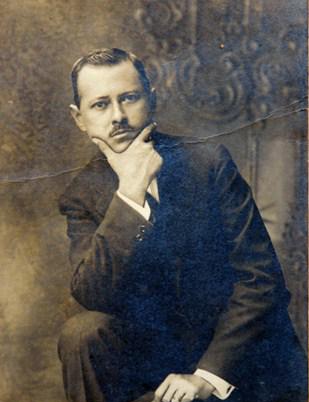
Guillermo Trujillo Durán was a Venezuelan poet and politician. He is also remembered for his work in journalism and film, alongside his brother Manuel Trujillo Durán. He worked as editor for several Maracaibo-based publications and published some collections of poetry. In politics, he first served in the government of Zulia before entering the National Assembly, where he was Vice-President on two occasions.
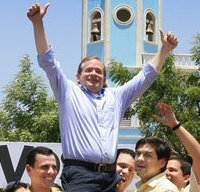
Juan Pablo Isidoro Guanipa Villalobos is a Venezuelan lawyer and politician who served as deputy and First Vice President of the National Assembly, leader of the Justice First political party and former governor of Zulia. He was a presidential candidate in the 2018 elections until boycott. Guanipa is the regional coordinator of the Justice First party in Zulia and chairs the Maracaibo Posible foundation.

San Francisco is a municipality in the metropolitan area of Maracaibo, Venezuela's second largest city. San Francisco covers an area of 185 square kilometres (71 sq mi) and recorded a population of 446,757 in the 2011 Venezuelan census.
The Revolution of the Reforms was a military movement in Venezuela between June 7, 1835, and March 1, 1836, against the government of José María Vargas, the conservative Congress, and the influence of José Antonio Páez. It was led by outstanding independence heroes such as Santiago Mariño, Diego Ibarra, Pedro Briceño Méndez, José Laurencio Silva, José María Melo, Blas Bruzual, Luis Perú de Lacroix, Pedro Carujo, José Tadeo Monagas, Renato Beluche, Andrés Level de Goda, and Estanislao Rendon.
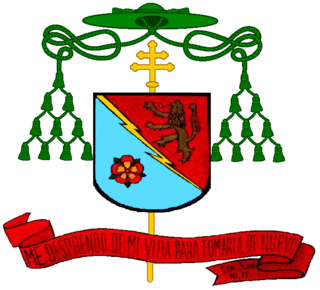
Roberto Lückert León was a Venezuelan Catholic archbishop. He became the first Archbishop of the Archdiocese of Coro in the state of Falcón beginning on 23 November 1998. He was the second Vice-President of the Episcopal Conference of Venezuela. He was also described as a fervent defender of Venezuelan democracy.
